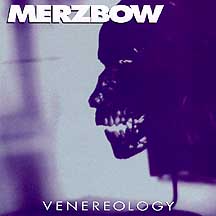Merzbox is a box set compilation by the Japanese noise musician Merzbow. It consists of 50 CDs spanning Merzbow's career from 1979 to 1997. 30 discs are taken from long out of print releases, while 20 are composed mainly of unreleased material. The box also contains two CD-ROMs, six CD-sized round cards, six round stickers, a poster, a black long-sleeve T-shirt, a medallion, and the Merzbook, all packaged together in a "fetish" black rubber box. It is limited to 1000 numbered copies. A Merzbox Sampler was released in 1997.

Venereology is an album by the Japanese noise musician Merzbow. It was inspired by death metal and grindcore.

Sha Mo 3000 is a studio album by Japanese noise musician Merzbow. It was released in October 2004 by the Brazilian label Essence Music in standard and deluxe editions, and is his first release for the label.

Turmeric is a box set album by the Japanese noise musician Merzbow. It marks Merzbow's return to using metals and feedback since switching to computers. The album art depicts Masami Akita's pet Silkie chickens, which have black skin and bones. They are also referred to on Animal Magnetism and Higanbana.

Noisembryo, subtitled Psycho-Analytic Study of Coital Noise Posture, is an album by the Japanese musician Merzbow.

Merzbow is a Japanese noise project started in 1979 by Masami Akita. Merzbow is best known for a style of harsh, confrontational noise. Since 1980, Akita has released over 400 recordings and has collaborated with various artists.

Camouflage is a studio album by Japanese noise musician Merzbow. It was released on January 14, 2009 by the Brazilian label Essence Music in standard and deluxe editions, and is his second album for the label.

Eucalypse is an album by the Japanese noise musician Merzbow. The title is a combination of apocalypse and eucalyptus.

Dadarottenvator is an album by the Japanese noise musician Merzbow. It is a limited edition of 175 hand-numbered copies, pressed on green vinyl, and housed in a wooden box. It was reissued on vinyl by Urashima in May 2020.

Merzbient is a boxed set album by the Japanese noise musician Merzbow, it is composed of previously unreleased raw material recorded 1987–90.

Pornoise/1 kg is a box set album by the Japanese noise musician Merzbow. Additional material from the sessions was released as Pornoise/Extra.

Lop Lop is a studio album by the Japanese noise musician Merzbow. It was released on December 3, 2011 by the Italian label Rustblade, and is his first release on the label. The title is a reference to Loplop, a bird-like alter ego of dada and surrealist Max Ernst. Rustblade says that Lop Lop is "a step in a new direction" and that "synths and guitars scream and sing in a way which allows them to be heard through all the oppressive noise".

Uzu Me Ku is an album by the Japanese noise musician Merzbow. It features the Koto, a traditional Japanese instrument, "manipulated through granular synthesis by digital and analogue electronics devices." According to Masami Akita, "Uzume Hikoyuzu" means "spiral generating" and "Itsu Akitsu" means "generating of particles". The album photos were taken at the Nagasawa Purification Plant in Kawasaki, Japan, which was designed by Mamoru Yamada.

Ko To No O To is a 7" release by the Japanese noise musician Merzbow. It is the first in a series of 7"s by seven different artists on the label.

Duo, subtitled Masami Akita & Kiyoshi Mizutani Selected Studio Sessions 1987–89, is a box set album by the Japanese noise project Merzbow. It is composed of unreleased studio sessions recorded with Kiyoshi Mizutani. Some of these recordings were used as raw material for solo releases like Scissors for Cutting Merzbow, but the original recordings were unreleased until now. These recordings mirror albums like Ecobondage, Enclosure, and Storage. The art edition comes with a bonus CD with a recording from 1979.

Tamayodo is an album by the Japanese noise musician Merzbow. It is described as "monotonic electro pulse-noise works by all analogue equipments."

Pulse Vegan is a 7" release by the Japanese noise musician Merzbow. It is available exclusively to backers of a Kickstarter campaign to fund a vegan food trailer in Austin, Texas being opened by the owner of Elevator Bath. The business is named Pulse Vegan after the recording.

Konchuuki is a studio album by the Japanese noise musician Merzbow. It was released on August 11, 2015 by the Brazilian label Essence Music in standard and deluxe editions, and is his third release for the label.

Gensho is the fourth collaborative studio album and seventh release by the Japanese experimental band Boris and noise musician Merzbow. It is presented in two parts; the first disc features re-recordings of several Boris songs and a cover of the My Bloody Valentine song "Sometimes" in drone-based, drumless style, while the second disc consists of new compositions by Merzbow. They are intended to be played at the same time, much like the previous Boris double album Dronevil, or as separate works.

Hatobana is a studio album by the Japanese noise musician Merzbow. It was released on October 14, 2016, by the Italian label Rustblade, and is his fifth release for the label. It was released as a double album and a deluxe edition with a bonus CD. It was originally announced for release on Noisoke Records in 2013.



















